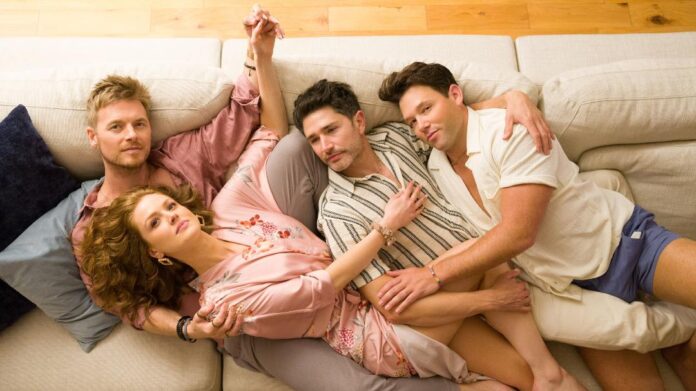
Out gay Philadelphia-based writer/director Jay Arnold’s latest film, “Shoulder Dance” will be available on demand Nov. 14. This engaging comedy-drama is set almost entirely at a house in the Hamptons owned by Ira (Matt Dallas), and his younger partner of ten years Josh (Taylor Frey). Josh wants more security in this relationship — e.g., marriage — but Ira is wary of the Marriage Industrial Complex. Josh also gets concerned about his relationship status when Ira’s long-lost friend Roger (Rick Cosnett) arrives with his girlfriend Lilly (Maggie Geha) for an overnight stay. The long-suppressed attraction Ira has for Roger might just come to a head during this reunion and it could jeopardize Josh’s life.
“Shoulder Dance” teases out each of the character’s emotions as the quartet drink, take drugs, have sex, and tell secrets and lies over the course of about 24 hours.
Arnold chatted with PGN about his new film.
Let’s start with some background. You’re from Philly. How did you get into filmmaking?
I was born and raised in the suburbs. I went to Cheltenham High School. I lived in Philadelphia my whole life. I ended up in advertising and had an agency for 30 years. A client said I could do TV commercials. I always wanted to be a filmmaker. I’ve made other films over the years, but I could never get three months to make a film. When I retired, I was able to put more time into writing and making the kinds of films I wanted to make.
What inspired these characters and the story of Ira reuniting with Roger, the one who got away?
They say, “Write what you know,” so a lot of it is loosely based on my experience. When I grew up, things were very different and binary. I felt like I lost more than one friendship when I was a kid because maybe there was a little bit too much emotional intimacy — and that happened to me with more than one of my closest friends. I thought about that. You see someone, or you hear their name, and think, “What really happened? Could I have done something different that I didn’t have this relationship my whole life that was so important to me when I was younger?” This film was an opportunity for me to re-look at those questions and resolve this for myself. Hopefully, other people can relate as well. It was a process of not closure, but of completion. Because I wrote the story, I got to make it up the way I wanted to. What if I could complete that now? What would that look like?
“Shoulder Dance” emphasizes honesty in friendships as well as romantic relationships. Can you talk about these themes and what your intentions were in telling this story?
When I was younger in those formative years, I carried a lot of that stuff, and I did notice that some of those situations informed the future. Why couldn’t I make a commitment, why wasn’t I good enough? Ira never really had a clear understanding of what happened with Roger, but he carried it and could not move forward and make a commitment until he had some form of completion or understanding or closure. I think many of us, gay men especially, carry feelings of rejection or not feeling good enough, from when we were younger.
Josh and Lilly are very chummy, which balances out the sexual tension between Ira and Roger and the dramatic tension between Ira and Josh. How did you create the power dynamics between the characters?
I thought it was important that Josh was strong. I didn’t want to play into Ira [as] the top and power guy. I think it’s interesting that Taylor Frey is taller than Matt Dallas and he has a big presence. Josh has moments of questioning, but it was important that he and Lilly were strong characters. There are different dynamics between different characters. I also shot the film linearly. I wanted the actors to become more intimate and familiar with each other over the course of the filming in the way they would discover each other anew over the weekend. I think that helps the relationships build and feel authentic.
Several characters draw lines in the sand, some of which are crossed. What can you say about the boundaries, which are respected, broken and possibly obliterated?
There are a lot of emotional whirlwinds happening in a very short period of time. As far as Josh goes, he feels uncomfortable. In this moment, when he kisses [another guy] it is just for a second or two because he’s drunk or high. He pulls back and says, “This is not what I want. This is not who I am.” Lilly has carte blanche to break any rules or lines. She’s an observer and a participant who is somewhat removed. I wanted her to shake things up, but she is not a villain. For Roger and Ira, in this situation, they did what they needed to do to complete the thing for themselves. It was more about an emotional connection than the physical sex part.
Roger can be read as a bisexual character in that he has sex with men and women, and Lilly is open-minded about hooking up with a girl at a party that she and Josh attend. Can you talk about depicting fluid sexuality in the film?
The Kinsey scale has always fascinated me. You have one end here and another here but the vast majority fall in between. It’s exciting to me to create new forms of relationship/friendship love that do not fit squarely in a bucket. I think more men have sex with other men than people want to think about.